#logical fallacies
Text
Brief definitions:
Ad Hominem: Trying to undermine the opponent's arguments by using personal attacks rather than logical argument
False Dilemma: Presenting two alternative states as the only possibilities when more possibilities may exist
Bandwagon: Presuming that a proposition must be true because many believe it to be true/everyone else is doing or saying it
Incomplete Comparison: Comparing two things that aren't really related, in order to make something more appealing than it would be otherwise
Strawman: Misrepresenting an argument so that it becomes easier to attack
False Cause: Citing sequential events as evidence that the first event caused the second
Slippery Slope: Claiming that a single event will lead to a series of events that would lead to one major event, or that event A will lead to event B which must lead to event C and so on until event Z
False Analogy: Assuming that if two things or events have similarities in one or more respects, they are similar in other properties too
Guilt by Association: Connecting an opponent to a demonized group of people or to a bad person in order to discredit their argument
Hasty Generalization: Making a claim based on evidence that is too small to prove the claim
–
We ask your questions so you don’t have to! Submit your questions to have them posted anonymously as polls.
#polls#incognito polls#anonymous#tumblr polls#tumblr users#questions#polls about ethics#submitted dec 16#logical fallacies
759 notes
·
View notes
Text
Explanations (more accurately, guesses and hypotheses) are not correct by default in the absence of other explanations.
If all anyone can come up with for why a painting won’t stay level is “a poltergeist,” it does not mean there’s a poltergeist. Whether or not a poltergeist exists is independent of what explanations have been considered.
This is one of those things that doesn’t seem like it needs explaining, but when people lack good points, logical fallacies can quickly become second nature.
This isn’t me on a high horse. I’m vulnerable to this, too, and have to be as careful as anyone to keep a clear head when frustrated. My past is full of me making terrible arguments.
It’s also annoyingly common in stories, as is characters not getting truly called out on it?
“Do you have a better explanation?”
“No, but that doesn’t make your hypothesis that it was a quantum pirate ghost correct.”
“WHY ARE YOU SO CLOSED-MINDED?!”
319 notes
·
View notes
Photo
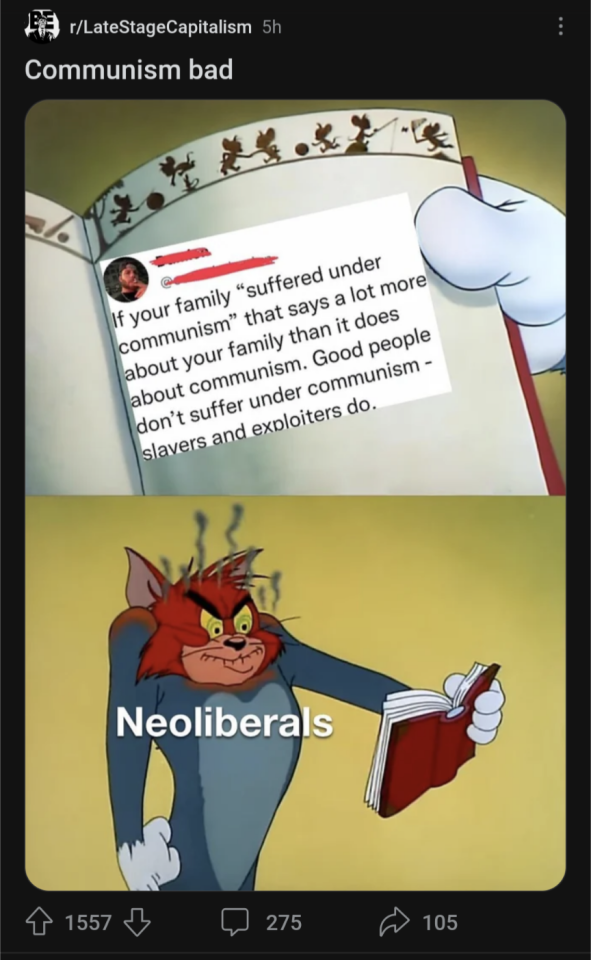


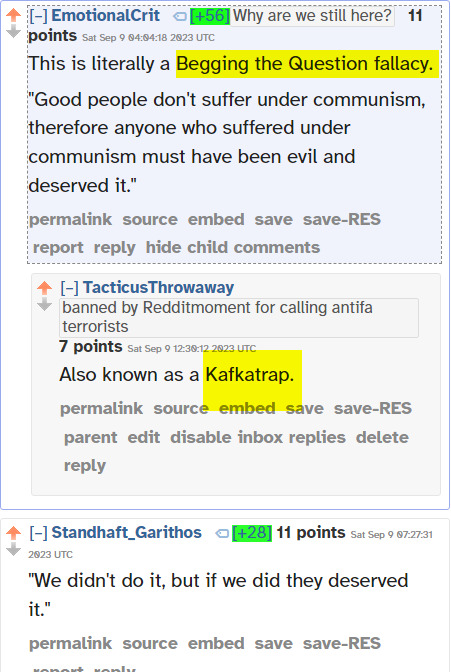
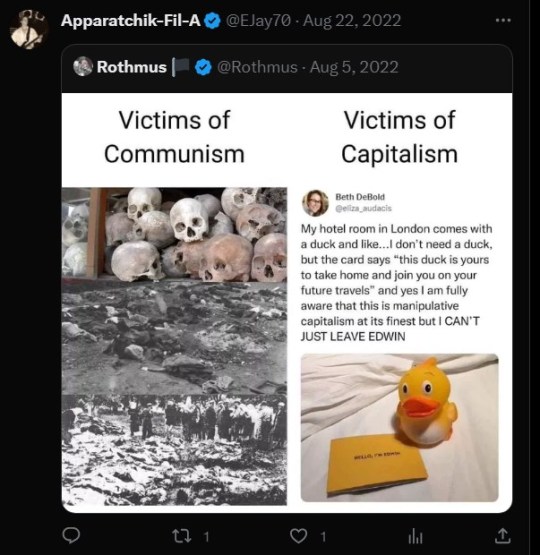
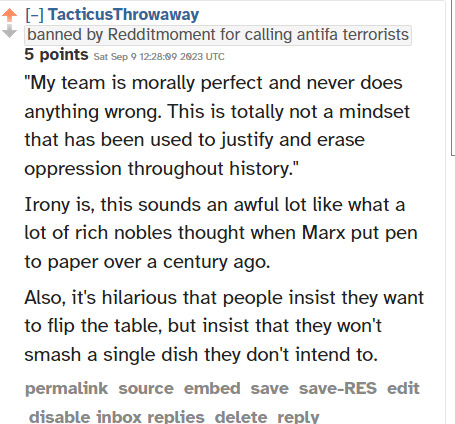
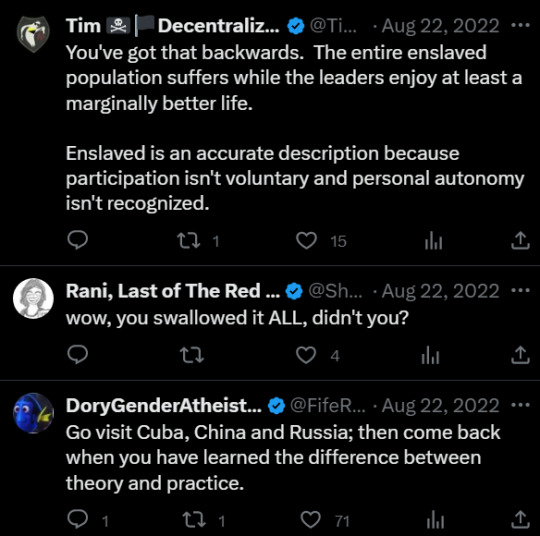
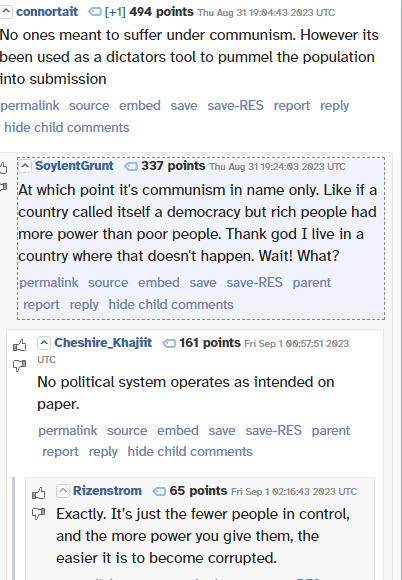
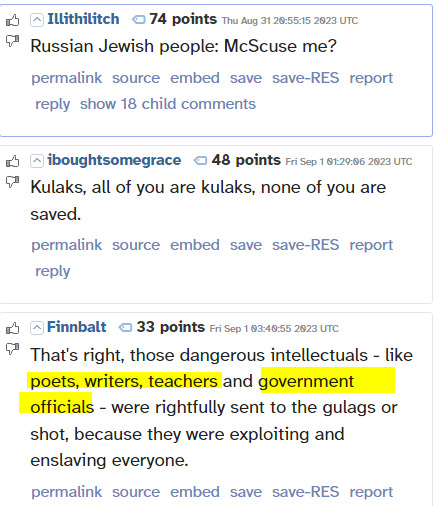
The original twitter account (commiedamion) seems to have been suspended. I did find an archive.
366 notes
·
View notes
Text
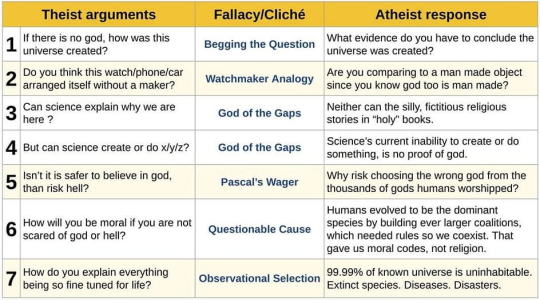
Do better than these, or don't bother.
PRATT: Points Refuted A Thousand Times.
#theist arguments#fallacies#begging the question#watchmaker analogy#god of the gaps#argument from ignorance#pascal's wager#questionable cause#PRATT#points refuted a thousand times#logical fallacies#religion#religion is a mental illness
110 notes
·
View notes
Text
Isabel: You write that because anti-Jewish bigotry is a conspiracy, it becomes a “self-sustaining cycle.” How does that cycle work?
Yair: In Kanye West’s anti-Semitic tweets, he [implies] that he’s going to attack Jewish people, and his rationale is that they blackball and silence those who act against them. This is a very clever little paradox, because if you, as a Jewish person, then say, “I think this is anti-Semitic,” and as a result of that, Kanye or anyone else who voices anti-Semitic sentiments suffers any consequences at all, then the anti-Semite can turn around and say, “Ha, you see? That proves that the Jews do control the things I said they control. Because when I tried to say anything about it, people tried to shut me up.” It’s a self-fulfilling conspiracy theory that provides its own evidence and can never be falsified in the mind of the anti-Semite.
Isabel: Those are some of the strongest conspiracy theories in general, right? The ones that feed into their own evidence in that way.
Yair: Exactly. A big question about anti-Semitism has always been how it has managed to persist for so long. You would think that at a certain point, a lot of these crazy ideas about Jewish people would be exposed as untrue, and that would lead people to reject them. And of course, many people do. But when you have a conspiracy theory that feeds on itself, it’s a perpetual-motion machine that will continue to sustain itself for quite some time.
— Why Conspiracy Theorists Always Land on the Jews
#isabel fattal#yair rosenberg#why conspiracy theorists always land on the jews#current events#antisemitism#politics#conspiracy theories#sociology#psychology#kanye west#logical fallacies
175 notes
·
View notes
Text
Celebrating 3,000 Followers*
"Right," said Om. "Now...listen. Do you know how gods get power?"
"By people believing in them," said Brutha. "Millions of people believe in you."
Om hesitated.
All right, all right. We are here and it is now. Sooner or later he'll find out for himself...
"They don't believe," said Om.
"But--"
"It's happened before," said the tortoise. "Dozens of times. D'you know Abraxas found the lost city of Ee? Very strange carvings, he says. Belief, he says. Belief shifts. People start out believing in the god and end up believing in the structure."
"I don't understand," said Brutha.
"Let me put it another way," said the tortoise. "I am your God, right?"
"Yes."
"And you'll obey me."
"Yes."
"Good. Now take a rock and go and kill Vorbis."
Brutha didn't move.
"I'm sure you heard me," said Om.
"But he'll...he's...the Quisition would--"
"Now you know what I mean," said the tortoise.
Terry Pratchett, Small Gods
*This post is in honor of you 3,011 people who like to see a Pratchett quote on your dash every day. Like a god of the Discworld, this blog only exists because people choose to follow it. Thanks to all of you who love to share this funny and poignant and chaotic world of Pratchett with strangers you will never meet. In the sharing, we are reminded of the things we believe and why they matter to us. You know what I mean.
#brutha#om#vorbis#small gods#discworld#terry pratchett#diety#gods#belief#atheism#power#religion#obedience#structure#hierarchy#fear#logic#logical fallacies#theology#life lessons#the lost city of ee#we are here and it is now#long quote#footnotes for followers
185 notes
·
View notes
Text
Another day, another explanation to a class of the Ethos, Logos, and Pathos of rhetoric in essay writing using Kirk, Spock, and McCoy...(and, of course, the fallacies that result when one of them runs amok)
#star trek#star trek tos#leonard mccoy#jim kirk#spock#essay writing#logical fallacies#i've just leaned into it at this point i'm not even embarrassed anymore
52 notes
·
View notes
Text
“Philosophical and Personal Musings on the Wizard Stone and the Axiom of Proliferation” – An Essay and Divinations for Arc 3 of “The Wizard, the Witch, and the Wild One”
From the Desk of The Bard Bullseye
Happy Birthday, Worlds Beyond Number!
Spoilers abound! This is an essay discussing the actual-play podcast “The Wizard, the Witch, and the Wild One” from the fine folks at @worldsbeyondpod It is an expression of my analysis of and engagement with the content of the second arc of the show and also contains some speculation about future plot and current themes. These interpretations are my own, include some reflections on my personal philosophy, and are written in a mostly academic style of writing (be warned, it’s around 3,000 words!). If you do read through it, I hope you find my points interesting and thought-provoking regardless of whether or not any of it turns out to be true (and I have done my level best to adhere to the facts of the story thus far, with transcript pages and timestamps cited when available/applicable).
Abstract (TL;DR, or I ain’t reading all that, but I’m happy for you):
The Wizard Stone’s discovery that the Axiom of Proliferation is untrue has major implications for the overarching story and the direction of the next arc. Herein, I explore my reaction to this moment in Episode 19 and how my experience and own philosophy potentially align with Stone’s. Then, I examine the logic of her argument and its implications for the greater worldbuilding in Umora. Specifically, there is a fundamental problem with the way that wizards are using the lingua arcana that is affecting the link between the Spirit and the Mortal worlds (i.e., the “greater binding”), and this is leading to detrimental effects. This, I believe is ultimately what Grandmother Wren (and now Ame) and Coven of Elders (and possibly the Man in Black?) are concerned with, though they have come to vastly different conclusions about who is at fault and how to solve this problem, which are yet to be revealed in the forthcoming third arc (see footnote 5).
Introduction
Something has piqued my interest and scratched a deep philosophical itch for me in the second arc of “The Wizard, the Witch, and the Wild One.” While the first arc introduced the characters, explored ideas of ‘quest fever,’ and masterfully wove in lore and character motivations for reclaiming Eursulon’s sword, Wavebreaker, the second arc has expanded upon the characters and their relationship to the greater philosophy of the Citadel and Umora.
I don’t usually speculate where stories might go next or craft my own fan theories. Especially for ongoing projects (i.e. TV shows, actual plays, books in a series, etc.), I tend to be along for the ride, and I spend time analyzing the story being told and the characters within. And rarely do I put these thoughts to paper, at least not coherently; I am more likely to ramble endlessly to a friend or lurk on Discord for others’ opinions, chiming in occasionally. However, I have noticed some things brewing in this arc that I wish to discuss at-length and even speculate upon: my perspective and analysis of the philosophy of the Wizard Stone, and the possible implications for the forthcoming third arc.
I don’t often see myself in stories. Not to say that I don’t see myself or parts of myself represented in media: i.e. demographically, socially, politically, etc., but rarely do I find a specific character or character motivation that ‘snipes through the duplex door’ where I go “oh shit that’s me” or “I relate to this on a deeper level.” This happened to me in Episode 19, when Suvi is investigating the records of her mother’s early time in the Citadel: her expulsion from the College of Divination and readmittance to the College of Abjuration because she had accused one of her professors of “treason against magic itself.”
Upon her dismissal from the Citadel, Stone wrote a dissenting missive to the Archmagi of the Citadel regarding one of the three metaphysical axioms, the Axiom of Proliferation, and how this particular axiom “does not describe any actual truth of the lingua arcana, nor does it more broadly describe any facet of the greater binding” (Ep. 19, transcript p. 12). She goes on to posit that not only is it “pure intellectual technology,” but that its continued acceptance as fact is a “danger to the future of wizardry” and “[a] stain on the face of magic itself” (Ep. 19, p. 12). An axiom in this context is described as “simple… laws that are given to young wizards about broad truths of spell casting in general… that are true across spells [and], … different schools of magic” (Ep. 19, p. 13). That is, “the Axiom of Proliferation is essentially that the more times a spell is written down … the weaker the spell becomes” (Ep. 19, p. 13).
An axiom as defined in philosophy is a statement that is self-evidently true and serves as a starting point for reasoning. Therefore, any argument against its truth would call into greater question the philosophical foundation of the Citadel itself. If Stone’s claim that this was not a true axiom had not been dismissed swiftly and discredited, it is possible (though highly unlikely, given the power of empire) that this would have led to a redefinition of the philosophy of wizardry in Umora.
This is what struck me like a bolt of lighting while listening to this episode. I did almost this exact thing when I was in grad school!
Stone is… me? Faulty logic and its effects
As part of my master’s degree, I took a philosophy seminar on bioethics, which covered some polarizing subjects and more fringe points of view. Most of these topics cannot be directly studied or supported by scientific evidence, so the conversation and academic debate is largely conceptual or theoretical (i.e., conducting research to investigate these ideas have varying states of legality and moral acceptability) (see footnote 1). This course was excellent and a bit out of my comfort zone, but it challenged me to think critically about fundamental logic and accepted ideas that often go unexamined until they are taken to the extreme. At one point in the semester, we were discussing a particular topic and the current state of debate surrounding it. Immediately, I was perplexed by some of arguments made to justify it, and at first, I didn’t have the language to express why. Much like Stone, I found myself screaming (internally) “you’re all idiots!” or “you’re missing the point/the bigger picture!” or “that’s not how that works!” Essentially, I had arrived at the conclusion that if this idea were to be implemented broadly in society, it would likely have major negative ramifications, and furthermore, not even achieve the desired and purported effect that they were arguing for!
Eventually, I figured out what the underlying problem was: a logical fallacy inherent and unidentified within the current debate. Since scholars had just accepted the argument at face value and moved on, most of the debate was concerned with its future implementation or theoretical follow-on effects on individuals and society at large. I did find some existing papers that danced around the idea of fallacious reasoning (i.e., that the theoretical benefits were greatly exaggerated, if not a zero-sum game, or that the negative long-term effects may outweigh the short-term benefits), but none named it specifically or even examined the logical argument the entire debate was predicated on. So, for my term paper, I researched and wrote about this fallacy, and in it, I discussed how the discovery and acknowledgment of it would reframe the debate and perhaps even bring about reform to existing systems!
In the process of writing and researching, I felt incredibly isolated intellectually (this was also peak-COVID so that didn’t help either). Now that I had put the pieces together, it seemed quite obvious to me, but it was difficult to find supporting evidence or other similar arguments to mine (even if they weren’t breaking the logic down so specifically). Was this thing I had reasoned actually true? Why had no one pointed this out before? What if I’m wrong? What if they’re right and I’m a fool for daring to challenge them? What does my professor think? They’re an expert and approved the topic, so I know I’m not entirely off-base, but do they agree with me? I knew that if I wrote a strong, supported, and persuasive argument, that I couldn’t fail, but I deeply cared whether or not I was actually right. It was also probably one of the first times that I wrote with passion (and specific planning ahead of time!), rather than churning out yet another good-enough research paper (that I may or may not have written days ahead of the deadline or the night before).
Thankfully, unlike Stone, my fears that I would not be taken seriously, or worse, told that I was flat out wrong (and be silenced) did not come to pass—my professor agreed wholeheartedly with my argument that this fallacy is pervasive in the current literature. (Though I feel must disclaim that I still could be wrong in some other aspect of my argument, and that simply arguing the existence of a fallacy can be treacherous! In philosophy, no one ever has the only or complete answer—if they claim to, they are either lying or ignorant.) As part of the course, we did a mock peer review in class and my professor sent us further feedback on our papers after we submitted our initial draft of the term paper.
One particular piece of feedback stands out to me upon reflection and comparison to Stone’s experience and the philosophy of wizardry. It said something along the lines of ‘We think that is a very admirable and unique take on this subject. No one found any fault in your logic; however, it is important to consider the practical implications of identifying this fallacy.’ Point taken, of course, that the mere identification of a flaw in logic is not the end of the conversation—it is merely the start of a new discussion and opportunity to surface new arguments.
In my case, the identification of the fallacy was the concrete thing I felt I could verifiably yell about (academically) to explain why I disagreed so vehemently with current literature (and some truly wild propositions made by certain scholars). Of course, one should not commit the ‘fallacy fallacy,’ which is that simply pointing out a fallacy invalidates the argument. Instead, it was a means to discuss practical implications: some less harmful methods, some overlooked existing solutions, and to pull knowledge from other related disciplines that had not yet been considered because this fallacy had yet to be identified (see footnote 2).
The philosophy of Stone’s accusation of ‘treason’ and treatise to the Archmagi
In listening to and reflecting upon this episode and the conclusion of the second arc, I wonder if Stone felt similarly to me: that she had a fundamental disagreement with the way that wizards (and the Empire) conduct magic. I wonder if she learned about the Axioms and something didn't sit right with her, so she dug into the philosophy or history of it. Moreover, I find it particularly striking that her original specialization was divination. Although it has not been stated outright, I think it can be plausibly inferred that Stone divined some kind of knowledge about the fundamental ‘wrongness’ of current wizardry and the disastrous follow-on effects it would have. She may have been unable to fully convey her revelation in the moment, and so just shouted ‘treason against magic’ at her mentor. As was the case with me, the Axiom of Proliferation was just the most concrete thing that Stone could point at to explain herself.
But beyond my own biases and affinity for Stone, it follows that she may well have examined or done a proof on the Axiom of Proliferation which led to her discovery that the premise of the Axiom was false. Let’s examine the argument that Stone may have made (and the one that Suvi may have done a poor proof of, by her own admission). The argument is as follows:
All Axioms of magic describe a truth about the fundamental nature of magic
The Axiom of Proliferation states that the more times a spell is written down (proliferated), the weaker the spell becomes, which is a truth about the fundamental nature of magic.
Therefore, the Axiom of Proliferation is an Axiom of magic.
This can be simplified:
All A’s have property B
C has property B
Therefore, C is A
This does not necessarily lead to a false conclusion, and while the argument may be valid, it may not always be logically sound, see for example:
All people are mortals.
John is a mortal
Therefore, John is a person.
In the Citadel’s view, there is no flaw here, because they teach (and presume) that the Axiom of Proliferation is true in the lingua arcana. Wizards, of course, are known by their secrets, so it follows that in their philosophy of magic, they would have some kind of justification for keeping magic limited to the select few. But, if one of the premises is false (in this case, premise 2), then this justification is in jeopardy. It stands to reason that Stone must have had serious evidence to declare that premise false, and as she was studying divination, it was likely a vision or prophecy of some kind. Presuming she is correct, then it also speaks to her incredible intelligence (although she did not have the social grace at 19 years old to deftly navigate this accusation) (see footnote 3a).
Although (as far as we know), Stone did not make another public ruckus about the Axiom upon returning to the Citadel, I don’t think this caused her to abandon the belief that the axiom was erroneous. Upon her readmission, she joined the College of Abjuration, specifically studying “counterspelling, dispelling magic, [and] sort of metamagic, … the magic of magic itself” (Ep. 19, p. 11). This might seem to be an odd choice for a backup specialization, but Stone’s issue with the Axiom and metamagic are deeply intwined philosophical concepts, as metamagic is essentially the equivalent to metaphysics in our world.
Wizardry and the nature of magic in Umora
Wizards are defined in Umora to be people that can use a “language of magic” the “lingua arcana” to cast magic, and importantly, that “they believe [the lingua arcana] is the language the universe uses to understand itself,” which was only coined about 250 years prior to the present story (Ep. 19, p. 16). At the end of the first arc, Suvi discovers from her father’s notes that the reflexive indicative, which was taught to her as a necessary component of the lingua arcana, is in fact entirely unnecessary for spellcasting. And further, Stone also doesn’t use the reflexive indicative, which is demonstrated through her unique casting of Mending in the very first episode. It is unclear so far in the worldbuilding (to me, at least) if the lingua arcana is the language the universe uses to understand itself, or if it is a construct used by people to explain, communicate, and more importantly cast magic in Umora (much like math and science are ‘constructs’ that describe the nature of our world, though the fact that it is constructed does not mean it is not true). If it is the latter, then there is likely to be forces at work, be it the components of spell casting (such as the reflexive indicative), the casters themselves, or others yet to be revealed, that are manipulating and restricting the nature of magic in Umora (see footnote 3b).
Thus, I would posit that there is some issue in the way that the restriction of the lingua arcana is affecting the “greater binding,” which is “the theory of magic, that magic is the interplay between the Spirit and the Real—or the Spirit and the Mortal” (Ep. 19, p. 14). Essentially, the lingua arcana describes the nature of the relationship between the Spirit and the Mortal world, while the greater binding is the metaphysical link between them. Stone all but confirms this in her letter to the Archmagi, that if the issue is left unresolved, it would endanger the future of wizardry (Ep. 19, p. 12).
Other pertinent wizarding history and context
Stone and Soft were also part of a group called the Acadator, which was dedicated to rooting out corruption and bad actors within the Citadel. We don’t really know too much else about them, the exact specifics of their philosophy, or if they still exist as a group (given that Steel and Eiorghorain were members). There is also some history surrounding two early wizarding groups pre-Citadel, the Antivoli and the Accordati, that had a philosophical disagreement about accepting the help of the Saraz Imperium for building the Citadel (specifically related to the sharing of magic), which led to a civil war called the Cataclysm of Carrow (Ep. 19, p. 16). In terms of timeline, the lingua arcana was coined in 1423, the term ‘wizard’ was coined in 1456, the Cataclysm of Carrow was in 1467, and three years later, in 1470, the Erien (Citadel) was built. The current story with the three protagonists is taking place in 1670, so it has only been 200 years since the Citadel was created, and the lingua arcana coined only 47 years prior to that (in less than a human lifespan).
Further, the creation of the Irulian Desert, the Erien, and the Citadel is a destructive history—wizards razed a verdant forest and turned it into a hot, unlivable desert with a miles high glass tower at the center. Additionally, the Wizards of the Citadel pool their magic beneath the Erien in an ‘Aerith,’ into which they deposit magical reserves and draw upon its combined strength when in crisis (see footnote 4). Mechanically, we see Suvi ‘donate’ unused spell slots at the end of the day.
We do know that Grandmother Wren’s cottage is located on top of a source of great magical power and serves as her sanctum. Wizards also use the towers of the Citadel as their sanctums, and I believe the following is speculation, as I do not think it has been canonized yet, but it is possible that the Aerith serves a similar purpose as a source of great magical power that previously belonged to the Spirits that wizards alone now use and control. This control is the key difference that may be contributing to, or even causing, detrimental effects on the greater binding.
The Witch(es)’s and the Wild One(s)’s perspectives
Additional evidence to support this theory of the Aerith's origins and purpose comes in Episode 23, when Eursulon meets the Man in Black and discusses their opinions on mortals, particularly wizards and their desire for control. Specifically, the Man in Black states, “that tower is the handle of a knife plunged deep into the heart of this world, a heart that is responsible for… a murder to the world of Spirits” (Ep. 23, 0:09:45-0:10:07).
Later, in a flashback with Mirara and Grandmother Wren, Mirara argues that “the world has burned before” (perhaps in reference to the creation of the Irulian Desert), that “[wizards] cannot be allowed to do this thing” (still unclear what that thing is), and the coven must make some kind of decision before it is too late (Ep. 23, 0:58:46-0:59:00). Wren pleas for another option, points this out as a false dichotomy, that they must not “be forced to choose between one slaughter and another,” and they should work to find common ground and coexist (Ep. 23, 0:59:07-0:59:33). Mirara retorts that she could never imagine the day that she would see “the will of wizards debase themselves” (i.e., that wizards would ever lower themselves from their current position of power) (Ep. 23, 0:59:39-0:59:52).
Wren then asserts a key point that correlates directly with Stone’s perspective: “There is nothing I have seen in the world of Mortals or of Spirits that shows me that there is a path that is wrong to tread” or anything that proves the pursuit of wizardry as inherently wrong (i.e., the lingua arcana), only those who “tread paths hurtfully, with cruel intention” (i.e., those abusing the lingua arcana for political purposes and imperial gain) (Ep. 23, 1:00:08-1:00:28). Wren also questions Mirara’s stance of wizardry as “an abomination against the natural order of the world” (Ep. 23, 1:00:40-1:00:47). Mirara then challenges her to consider her point of view and insists that even Wren cannot deny that “the poison of wizards does not spread so quickly as to choke the life from this world” (Ep. 23, 1:01:03-1:01:09).
My pure speculation and fan theory:
From this conversation, I postulate that Mirara and the Coven has taken an extremist and doomed perspective on the harm that is resulting partially from the Axiom of Proliferation (and perhaps the Aerith as well), while Grandmother Wren took a reformist stance. This would put her and her position as the Witch of the World’s Heart at odds with whatever plan the Coven intends to enact. Given what we know of the Witch Class and the other domains of the Coven, their plan is quite possibly violent, retributive, and holds little to no concern for the Mortals or people of Umora.
The third arc will begin with Ame’s meeting with the Coven of Elders at the North Pole, where they will attempt to destroy her station as the Witch of the World’s Heart. For all of the reasons above, I believe this event will connect directly to Stone’s declaration of “treason against magic itself,” but I will just have to (patiently) wait and see (see footnote 5).
Footnotes:
(1) I am well aware that I am being quite vague and obtuse regarding this subject and what specifically I was researching. Mainly because a) that’s not really the point of these musings, this is just some background info and context to explain my philosophy which is already longer than I would like, b) it would be impossible to do justice to an overview of this complex subject in an essay about something that resonated with me in a D&D podcast (and which does not engage with that subject directly, at least not in this context), c) I’ve already written a paper on this subject and am not interested in regurgitating it here, and d) Nunya Binyess (i.e. I could still be wrong about this fallacy and I’d rather discuss WWW than start a tangential IRL philosophical or political argument on this forum).
(2) Though on a deeper level, I partially disagree with the idea that I needed to account for the practical implications of the fallacy within the paper. I disagree that when challenging the fundamental nature of something (e.g., an erroneous argument, a misinformed policy, or an unjust system), there must be an immediate remedy or solution offered up. In my philosophical opinion, once a fallacy like that is identified for something that we hold to be fundamentally true, we need to sit in that revelation and undo the thought processes created by the incorrect assumptions. You cannot flip a switch and suddenly reverse all of the justifications that have gone into supporting a flawed, ingrained argument. To undo a pervasive, incorrect fundamental idea that has been implemented, internalized, or proliferated, first it must be fully examined for all its flaws, rescinded, and only then do we start from square one and think about practical changes (in a perfect world, of course, I am fully aware that the world does not work this way). I do often wonder about this reactive nature in society to demand immediate alternatives and solutions when norms are challenged, though I recognize this is a result of different lived experiences and worldviews. After all, this reactionary nature is true in Umora as well, and the wizards of the Citadel “tend to be a lot more about praxis and practice” (Ep. 19, p. 14).
(3a) Perhaps Stone rolled a nat 20 on some kind of intelligence check for the vision, but rolled a nat 1 on her Persuasion check against Sleep!
(3b) There is another essay I could write here about the history of science and empire (another grad school course) and the reflection of this in the Imperium, its taxonomy, and the (anti)-democratization of knowledge, but perhaps another time.
(4) Something that occurred to me when piecing together the Erien and the Aerith was the similarity to Morrow’s derrick that harnessed Naram’s power in the first arc. Both serve similar purposes as well, of generating magic and magical items. It makes me wonder if it was intended for the derrick to be Morrow’s poor attempt at recreating the glory of the Citadel, or if this is just a happy coincidence/connection between the arcs.
(5) I do want to briefly acknowledge the nature of improvisational storytelling in this situation, and that anything can change, be clarified, canonized, etc. at any point. This is partly why I don’t like to speculate much myself, because I trust the creators to tell the story the way they want to and follow the paths that appear, without projecting my own hopes or prescriptions when I listen to their wonderful creation that has been crafted with such care. It is also why my theory in the end is limited to the meeting with the coven- truly anything could happen at the beginning of the next arc, and whatever I might come up with is likely less interesting than what will happen. (NB: There is nothing wrong with fan theories or head canons! It’s just not usually something that interests me!) I merely saw a connection and through-line that deeply resonated with me in this second arc and felt compelled to write about it. Also, Worlds Beyond Number and WWW is just so fucking great, and it truly astounds me that this story is so deep that I have somehow written a 12-page essay analyzing essentially a 20-minute segment of one episode. I pray to Enzo that there are no grievous errors or spelling mistakes, but I wanted to post this on WBN’s first birthday! 🧡
#worlds beyond number#worldsbeyondpod#the wizard the witch and the wild one#www spoilers#wbn spoilers#wbn#wbn pod#the wizard stone#axiom of proliferation#philosophy#fan theory#chandri newell#soft and stone#the citadel#umora#fan essay#essay writing#food for thought#critical thinking#logical fallacies#coup crew
28 notes
·
View notes
Text
common anti-vegan arguments that are flawed
1. ad hominem
example: vegans are unattractive, ugly, annoying and mean; therefore veganism is bad
2. whataboutism
example: what about people who don't have access to plant based food or cannot go vegan due to health reasons
3. whitesplaining
example: white people calling veganism racist, dismissing all the POC who are vegans and speaking over them (also: what about indigenous people who hunt to survive)
4. purity culture / perfectionism
example: veganism isn't perfect; therefore it's bad
5. personal beliefs
example: i love animals so it's okay for me to eat them or i hate vegetables, why should i eat them
6. pleasure
example: bacon tastes good, therefore we have the right to kill and eat pigs
7. false dichotomy
example: if you defend animal rights, you're not defending human rights (this can be whataboutism too)
8. strawman
example: vegans totally think humans are herbivores; therefore veganism is bullshit
9. false health concerns
example: vegans don't get enough protein
10. might equals right
example: humans are superior to animals, therefore it's okay for to use them as we see fit
11. reversing facts
example: animal agriculture is actually better for the environment than plant agriculture
12. the norm
example: supporting animal agriculture is normal, because it's so common and it's how humans have lived for thousands of years
13. judging people by their looks or health
example: assuming someone is "in poor health" based on how they look and believing it must be because they're a vegan (see also: ad hominem and false health concerns)
14. personal feelings
example: i hate vegans because they make me feel uncomfortable, therefore being anti-vegan is justified and logical
#this is not a complete list by any means#just my thoughts#logical fallacies#natural necessary normal nice#veganism#animal rights#vegan
14 notes
·
View notes
Text
Brief definitions:
Ad Hominem: Trying to undermine the opponent's arguments by using personal attacks rather than logical argument
False Dilemma: Presenting two alternative states as the only possibilities when more possibilities may exist
Bandwagon: Presuming that a proposition must be true because many believe it to be true/everyone else is doing or saying it
Incomplete Comparison: Comparing two things that aren't really related, in order to make something more appealing than it would be otherwise
Strawman: Misrepresenting an argument so that it becomes easier to attack
False Cause: Citing sequential events as evidence that the first event caused the second
Slippery Slope: Claiming that a single event will lead to a series of events that would lead to one major event, or that event A will lead to event B which must lead to event C and so on until event Z
False Analogy: Assuming that if two things or events have similarities in one or more respects, they are similar in other properties too
Guilt by Association: Connecting an opponent to a demonized group of people or to a bad person in order to discredit their argument
Hasty Generalization: Making a claim based on evidence that is too small to prove the claim
–
We ask your questions so you don’t have to! Submit your questions to have them posted anonymously as polls.
#polls#incognito polls#anonymous#tumblr polls#tumblr users#questions#polls about ethics#submitted dec 16#logical fallacies
590 notes
·
View notes
Note
You realize your logic is the same used by bootleggers to justify cops murdering people, right?
this is a false equivalence, one whose wording both positions its claim as unquestionably true without a shred of evidence and simultaneously attempts to shame the person it is aimed at by leveraging a supposed violation of shared moral values.
cops aren't a public service and being unfairly told off, dismissed from class, or even yelled at by a teacher is in no way comparable to systemic racial murder. they are both bad things that happen a lot, but any comparison beyond that is unreasonable and frankly inappropriate. you should reconsider your use of rhetorical devices as substitute for arguments. i suggest you see yourself out.
#jeez louise 🙄#fallow buzzes#serious post#ask#anon#logical fallacies#police brutality#also briefly transported to a world in which bootleggers defended cops. i mean maybe its not like i was there in the 20s
26 notes
·
View notes
Text
By making the term "man" subsume "woman" and arrogate to itself the representation of all of humanity, men have built a conceptual error of vast proportion into all of their thought. By taking the half for the whole, they have not only missed the essence of whatever they are describing, but they have distorted it in such a fashion that they cannot see it correctly. As long as men believed the earth to be flat, they could not understand its reality, its function, and its actual relationship to other bodies in the universe. As long as men believe their experiences, their viewpoint, and their ideas represent all of human experience and all of human thought, they are not only unable to define correctly in the abstract, but they are unable to describe reality accurately.
The androcentric fallacy, which is built into all the mental constructs of Western civilization, cannot be rectified simply by "adding women." What it demands for rectification is a radical restructuring of thought and analysis which once and for all accepts the fact that humanity consists in equal parts of men and women and that the experiences, thoughts, and insights of both sexes must be represented in every generalization that is made about human beings.
-Gerda Lerner, The Creation of Patriarchy
56 notes
·
View notes
Text

"... when two opposite points of view are expressed with equal intensity, the truth does not necessarily lie exactly halfway between them. It is possible for one side to be simply wrong."
-- Richard Dawkins
The midpoint between a truth and a falsehood is still a falsehood.
112 notes
·
View notes
Text
Ad Hominem Fallacy

Patreon
#studyblr#notes#writing#writing notes#essay writing#debate#debating#fallacies#logical fallacies#writing fallacies#fallacies in debate#fallacies in writing#latin#latin words#ad hominem#english#research#researching#education#argumentative writing#argumentative essay
7 notes
·
View notes
Note
Here's something like a shower thought regarding Swiss cheese: The more cheese you have, the more holes it has. The more holes the cheese has, the less cheese you have. Thefore; the more cheese you have, the less cheese you have.
Fascinating!
Ooh! So the more of your Swiss cheese I eat, the less cheese you'll have, the less holes you'll have, the more cheese you have! 🤪
Therefore, the more of your Swiss cheese I eat, the more you'll have!
I think we found the solution to world hunger! 😁🤣
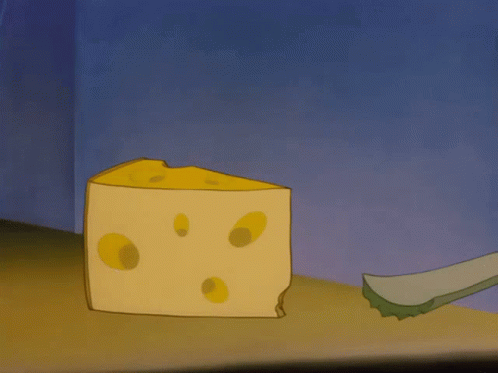
(Jokes aside, anyone know what type of logical fallacy this is? I'm curious.)
14 notes
·
View notes
